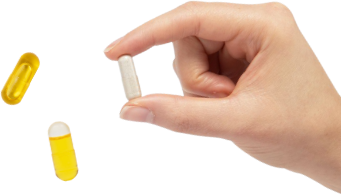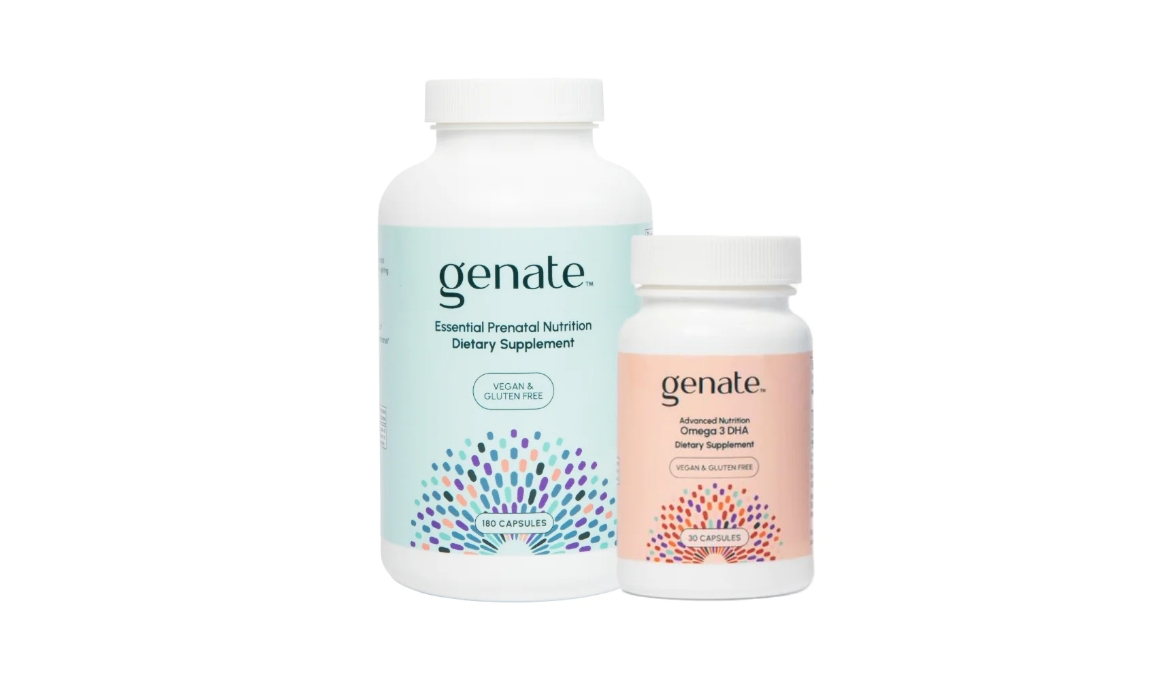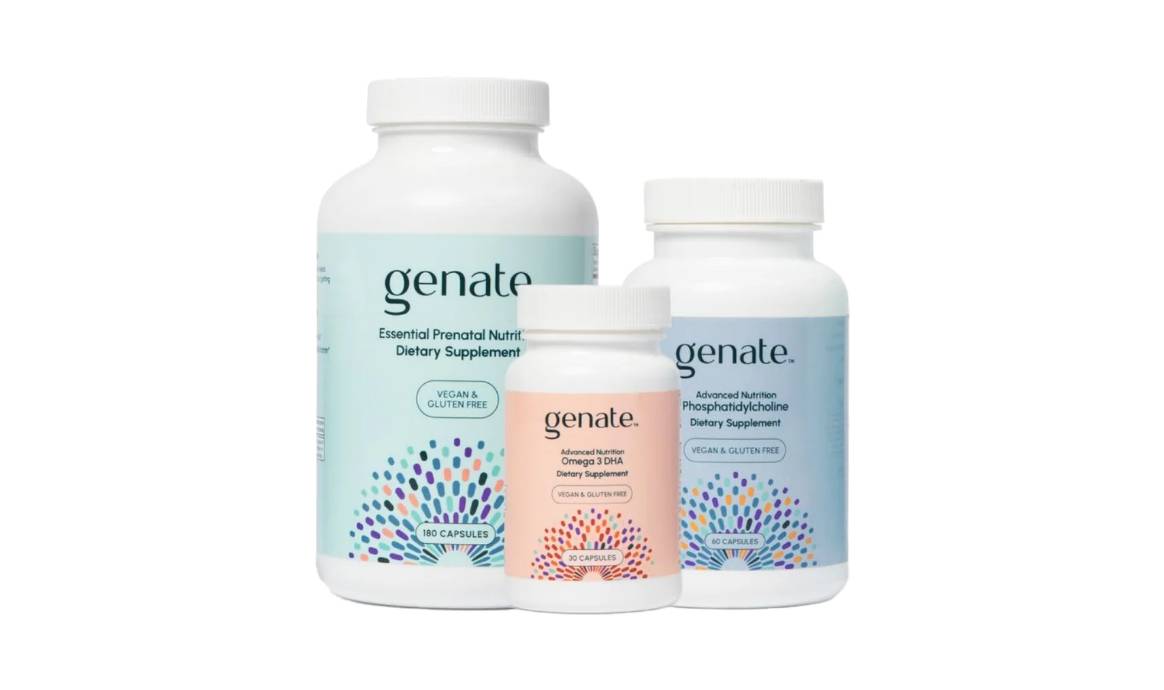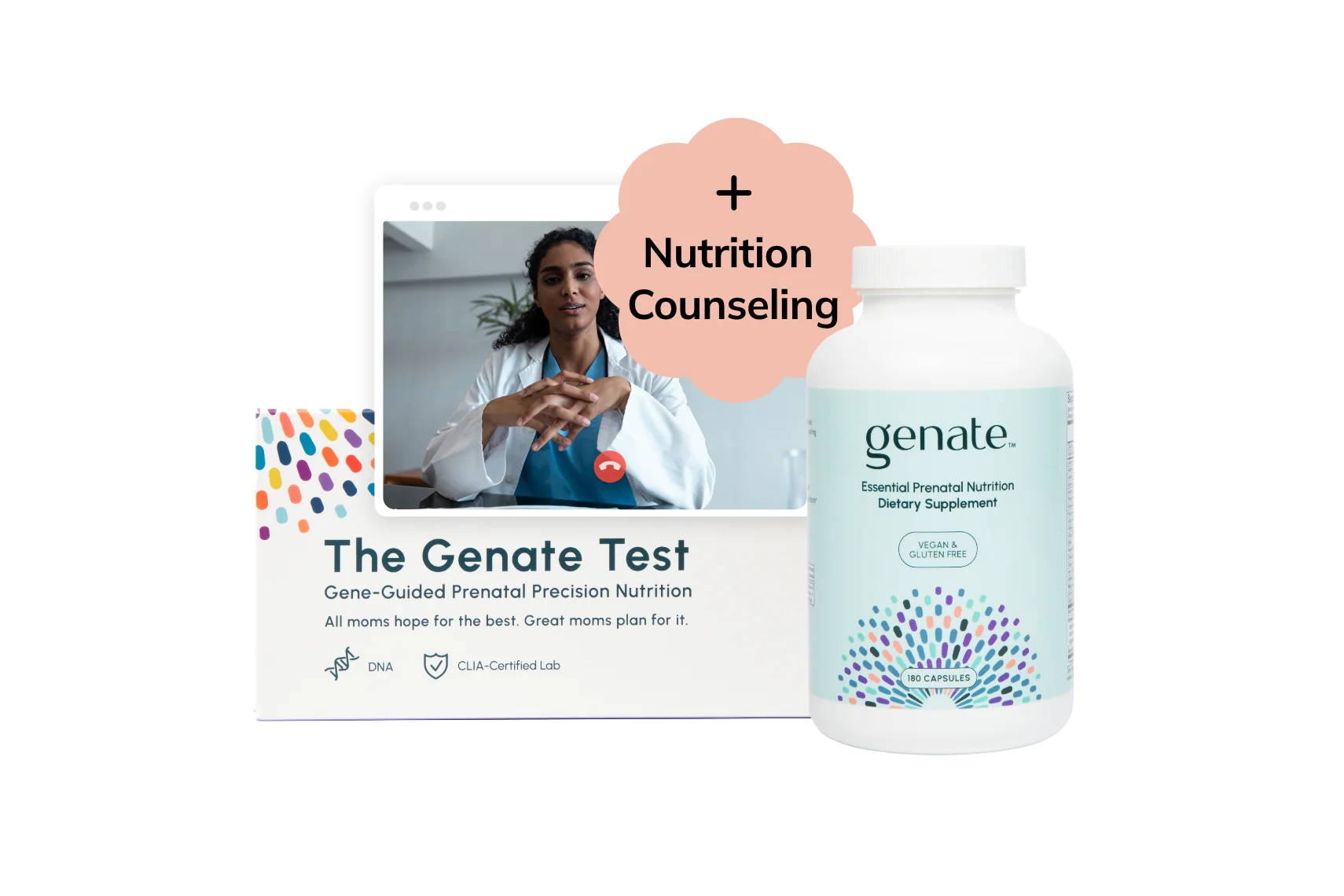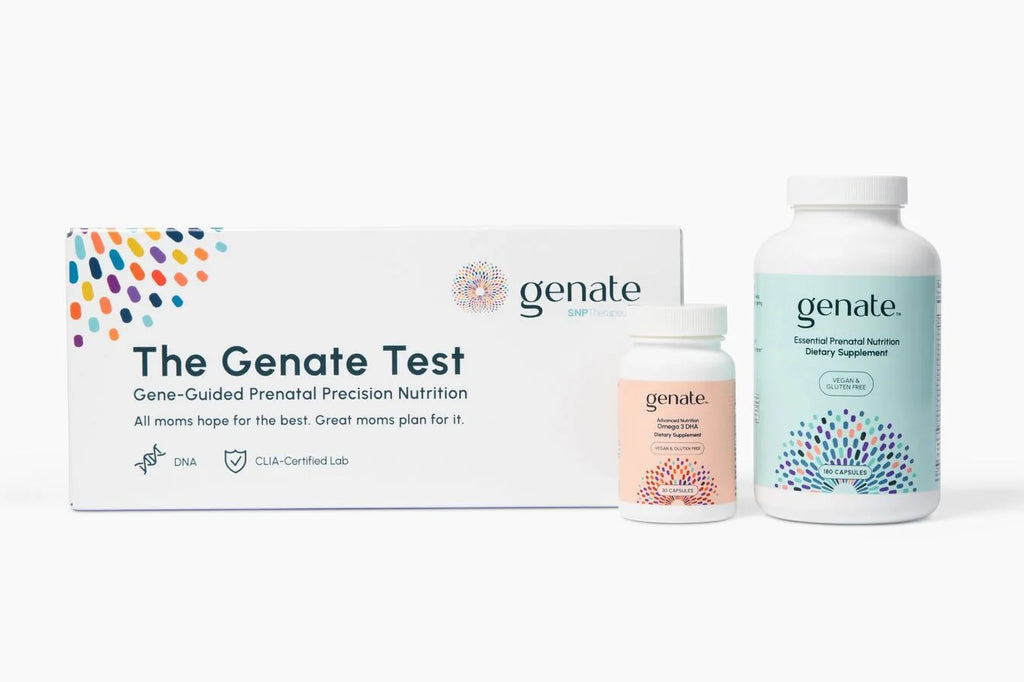The Dietary Guidelines for Americans recommend 450 mg of choline per day during pregnancy and 550 mg per day while breastfeeding.[13]

PRENATALS
Choline in Pregnancy: Key Benefits for You and Your Baby
medically reviewed by Cara Everett, MS, RDN, LDN • September 22, 2023 • Updated August 26, 2024
Every parent wants to give their baby the best possible start in life. For many expecting moms, that means taking a daily prenatal vitamin. Unfortunately, most prenatals are missing a key nutrient: choline. Read on to learn about the roles of choline during pregnancy and how to make sure you’re getting enough in your diet.
Key Takeaways
- Choline is critical for the development of your baby’s neural tube, brain, nervous system, and cell membranes.[1]
- Choline deficiency during pregnancy has been linked to neural tube defects, preterm birth, poor cognitive development, and increased risk of preeclampsia.[2]
- About 90% of women don’t consume enough choline from their diet or supplements.[3]
When you’re pregnant, getting the right nutrition is critical for your health and the development of your baby. And the impact of the foods you eat now can last a lifetime, especially in the case of choline. This nutrient is vital for the growth of your child’s brain and nervous system, and research is increasingly showing us that a lack of choline in pregnancy can affect children’s mental health, social skills, and brainpower for years to come.
What is Choline?
Choline is a key nutrient needed for DNA methylation, brain function, cell membrane formation, and fat metabolism. It was established as an essential nutrient by the National Academies of Medicine in 1998, pointing to the fact that humans can’t survive without it.[3] Choline is especially important in pregnancy because it’s needed in high amounts as a neurotransmitter and in the formation of a baby’s neural tube, brain, spinal cord, and nervous system.
Choline can be obtained from food and made by the body in small amounts. However, genetic misspellings prevent up to 70% of people from making enough choline to meet their needs.
For these people, getting adequate choline from food or supplements is vital to prevent muscle damage and fat buildup in the liver. And during pregnancy, choline deficiency may lead to devastating effects including neural tube defects and impaired brain function.
Choline for Babies: How it Supports Fetal Development
Adequate choline is absolutely essential for babies in the first 1,000 days of life when nutrition has the biggest impact on brain function and growth.[4] Here are some of the specific benefits of choline for your baby.
Brain Development, Memory, and Learning
Choline is critical for proper development of the brain and nervous system. It aids in the formation of neural connections, which are necessary for brain function and form at a rapid pace during pregnancy and the first two years of life.[5] Choline is also the primary neurotransmitter for your baby in the womb. After birth, acetylcholine is made from choline and takes over as a key neurotransmitter.[6] More recent studies suggest that higher choline intakes during pregnancy are associated with increased attention spans and a lower risk of behavioral problems and mental illness later in life.[7,8]
Choline also plays a role in memory formation and learning processes. Researchers think this happens through the influence of choline as a one-carbon nutrient on DNA methylation, which controls the expression of genes and proteins involved in memory and learning. Animal studies indicate that choline supplementation can improve both short- and long-term memory in offspring.[5]
DNA Methylation
As mentioned above, DNA methylation is the process by which your body regulates gene expression. In scientific terms, it’s the addition of methyl groups (donated by one-carbon nutrients such as choline, folate, and betaine) to DNA in specific spots. The addition of these methyl groups can turn genes on or off, thereby regulating their function in the body.[9]
Animal studies show that the amount of choline consumed by moms during pregnancy affects the degree of DNA methylation and gene expression in their offspring. The long-term effects of these changes include altered brain function and increased risk of certain diseases.[10]
Neural Tube Formation
Choline contributes to the development of the neural tube, which eventually forms the baby's brain and spinal cord. Studies show that choline supplementation in pregnancy may reduce the risk of neural tube defects such as spina bifida and anencephaly.[11]
Choline for Pregnancy: Why it’s Important for You
Choline helps support a healthy pregnancy in a number of ways. Let’s take a look at each one.
Positive Pregnancy Outcomes
Choline supports the body’s ability to lower homocysteine levels by converting it to the amino acid methionine. Low choline levels in mothers have been linked to higher rates of pregnancy complications such as preeclampsia (high blood pressure), which may be associated with high homocysteine levels. But supplementation with choline may help lower the incidence of both preeclampsia and gestational diabetes.[11]
Placental Health
Choline is also important for the development of the placenta, the organ that connects the mother to the fetus and facilitates the exchange of nutrients and waste products. Much of the choline you consume or make during pregnancy is transferred to the placenta, where it is used to nourish your growing baby.
Fat Metabolism and Liver Health
A healthy liver is crucial for maintaining optimal placental function. Choline helps prevent the accumulation of fat in the liver and supports its proper functioning. Choline deficiency caused by low dietary intake or SNPs that interfere with choline metabolism can lead to fatty liver disease, liver damage and poor placental health.
Nervous System Support
Choline is a precursor of acetylcholine, a neurotransmitter involved in various cognitive functions, including attention and focus. Adequate choline levels support the production and release of acetylcholine, which can positively influence the attention span of both mother and child.
Brain Health and Mood Regulation
Studies show that adequate choline intake may potentially reduce the risk of cognitive disorders, such as age-related cognitive decline, dementia, and Alzheimer's disease. During pregnancy, higher choline levels have been associated with lower rates of stress and depression in new moms.[12]
Food Sources of Choline
Dietary choline can be found in both plant and animal foods. Animal sources include:
- Beef
- Salmon
- Eggs (most of the choline is in the yolk)
- Chicken
- Fish (salmon, tuna, cod)
- Pork
You can also get choline from plant-based foods such as:
- Soy (tofu, edamame, etc.)
- Potatoes
- Beans
- Broccoli
- Nuts
How Much Choline Do Pregnant Women Need?
The Dietary Guidelines for Americans recommend 450 mg of choline per day during pregnancy and 550 mg per day while breastfeeding.[13] Despite the importance of choline for fetal development, it is not an ingredient in most prenatal vitamins, and fewer than one in 10 pregnant women ingest sufficient amounts.
The best time to start supplementing with choline is before conception, to ensure your body has enough choline to support the early stages of brain development. A prenatal multivitamin that contains choline, such as the Genate Essential Prenatal Vitamin, is a great foundation to support you and your baby. This prenatal contains 450 mg of choline per serving size, and it boasts 20 key nutrients to encourage healthy growth.
A dietitian or healthcare provider can help you choose the best type and amount of choline to take during and after pregnancy.
How Do Genetics Affect Your Choline Status During Pregnancy?
Common genetic variants in choline pathways can affect how your body metabolizes this nutrient. The only way to determine if you have one of these variants is to have genetic nutrition testing such as that provided by The Genate Test.
Studies show that over 70% of people have at least one gene variant, called a single nucleotide polymorphism (SNP), that can affect the metabolism of key pregnancy nutrients like choline. SNPs lead to differences in how effectively essential nutrients get passed from mother to baby. SNPs can reduce the efficiency of enzymes necessary for converting nutrients from their ingested forms into those needed for fetal growth and cognitive development.
Reduced amounts of essential nutrients, such as folate, DHA, and choline, can affect fetal brain and central nervous system development and may impact the cognitive potential of children later in life. However, metabolic inefficiencies caused by SNPs can be overcome with the right supplementation if you know you have the genetic variants.
The Genate Test focuses on one-carbon metabolic pathways, identifying key genetic variants to determine how your genes are impacting your body’s metabolism of nutrients essential for fetal growth and cognitive development. Using each client’s test results, we help expectant mothers understand how their diet and genetics may be impacting their developing baby. With the test results and nutrition counseling, you can customize your diet and supplement intake to optimize your health and your baby's brain development.
Bottom Line
This article is not intended as medical advice to treat or diagnose any health condition but rather as educational health information for the general public. It should not be used as a substitute for individualized medical care from your healthcare provider.
Shop the Article
Save 23% today!
Genate Essential Prenatal Multivitamin + Advanced Omega-3 DHA Package
Bundle to increase savings and provide the foundational nutrients needed for optimal health and development.
From $72 per month
Save 23% today!
Comprehensive Prenatal Support Package
Genate Essential Prenatal Multivitamin + Advanced Omega-3 DHA + Phosphatidylcholine
Our most comprehensive bundle - you’ll receive our Essential Prenatal Multivitamin, Advanced Phosphatidylcholine, and Advanced Omega-3 DHA.
From $110 per month
Save 30% today!
Comprehensive Prenatal Nutrition Bundle
Buy the Genate Test and a nutrition counseling session with a Genate registered dietitian, and receive a 30-day supply of the Genate Essential Prenatal Multivitamin FREE. Purchase includes a 90-day prenatal multivitamin subscription at our best monthly price.
$309

Cara Everett, MS, RDN, LDN
Cara Everett, MS, RDN, LDN is a registered dietitian nutritionist with a passion for helping people optimize their health with sustainable diet and lifestyle changes. She provides nutrition counseling to clients of all ages, with specialties in nutrigenetics, women's health, and chronic medical conditions.
Cara is also a health writer and editor with over 20 years of experience creating content for print and digital media outlets, nutrition and wellness blogs, and medical white papers. Her work has been featured on websites such as the National Council on Aging, Everyday Health, HelpGuide, MarketWatch, and Verywell. Cara's current writing covers women's nutrition and nutrigenetics in pregnancy and lactation.
As lead dietitian for SNP Therapeutics, Cara shapes content strategy, medically reviews and edits articles, and provides gene-focused medical nutrition therapy for clients. She holds Bachelor of Science and Master of Science degrees in Nutrition from Texas A&M University and completed her dietetic internship at the University of Kentucky Hospital.
Sources
- Jaiswal A, Dewani D, Reddy LS, Patel A. Choline supplementation in pregnancy: Current evidence and implications. Cureus. 2023;15(11):e48538. https://doi.org/10.7759/cureus.48538
- Jaiswal A, Dewani D, Reddy LS, Patel A. Choline supplementation in pregnancy: Current evidence and implications. Cureus. 2023;15(11):e48538. https://doi.org/10.7759/cureus.48538
- Wallace, TC, Blusztajn, JK, Caudill MA, Klatt KC, Natker E, Zeisel SH, et al. Choline: The Underconsumed and Underappreciated Essential Nutrient. Nutr Today 2018;53(6): 240-253. https://doi.org/10.1097/NT.0000000000000302
- Schwarzenberg SJ, Georgieff MK, Daniels F, Corkins M, Golden NH, Kim JH, et al. Advocacy for improving nutrition in the first 1000 days to support childhood development and adult health. Pediatrics. 2018;141(2): e20173716. https://doi.org/10.1542/peds.2017-3716
- Derbyshire E, Obeid R. Choline, neurological development and brain function: A systematic review focusing on the first 1000 days. Nutrients. 2020;12(6):1731. https://doi.org/10.3390/nu12061731
- Cleveland Clinic. Acetylcholine. Updated December 30, 2022. Accessed July 11, 2024. https://my.clevelandclinic.org/health/articles/24568-acetylcholine-ach
- Bahnfleth CL, Strupp BJ, Caudill MA, Canfield RL. Prenatal choline supplementation improves child sustained attention: A 7-year follow-up of a randomized controlled feeding trial. FASEB J. 2022;36(1):e22054. https://doi.org/10.1096/fj.202101217R
- Hunter SK, Hoffman MC, McCarthy L, D'Alessandro A, Wyrwa A, Noonan K,et al. Black American maternal prenatal choline, offspring gestational age at birth, and developmental predisposition to mental illness. Schizophr Bull. 2021;47(4):896-905. https://doi.org/10.1093/schbul/sbaa171
- Moore L, Le T, Fan G. DNA methylation and its basic function. Neuropsychopharmacol 2013;38:23–38. https://doi.org/10.1038/npp.2012.112
- Zeisel S. Choline, other methyl-donors and epigenetics. Nutrients. 2017 9(5):445. https://doi.org/10.3390/nu9050445
- Jaiswal A, Dewani D, Reddy LS, Patel A. Choline Supplementation in pregnancy: Current evidence and implications. Cureus. 2023;15(11):e48538. https://doi.org/10.7759/cureus.48538
- Hunter SK, Hoffman MC, McCarthy L, D'Alessandro A, Wyrwa A, Noonan K, et al. Black American maternal prenatal choline, offspring gestational age at birth, and developmental predisposition to mental illness. Schizophr Bull. 2021;47(4):896-905. https://doi.org/10.1093/schbul/sbaa171
- Dietary Guidelines for Americans, 2020-2025. 9th Edition. U.S. Department of Agriculture and U.S. Department of Health and Human Services. DietaryGuidelines.gov Published December 2020. Accessed August 13, 2024.
Take the Genate Quiz
Take our Nutrition Quiz to learn more about your nutrition journey.
Read Our Latest Articles
Frequently Asked Questions
How much choline do I need for pregnancy?
Why is choline important during pregnancy?
Choline is a critical nutrient for liver health, neurotransmitter production, DNA methylation, fat metabolism, and development of the neural tube, brain, nervous system, and cell membranes.
When is choline most important in pregnancy?
For fetal brain development, studies show that the second trimester is the key window for adequate choline intake.
How do you get choline during pregnancy?
Choline can be made by the body from phosphatidylcholine, and you can get it from foods and supplements.

